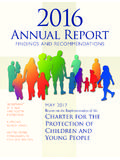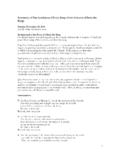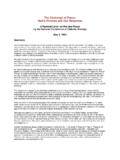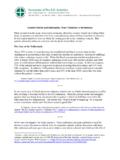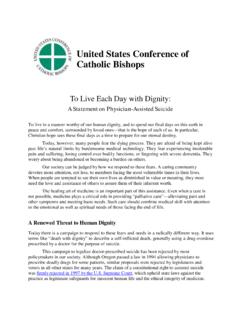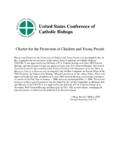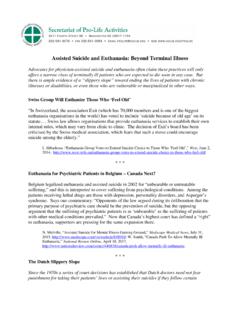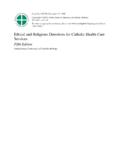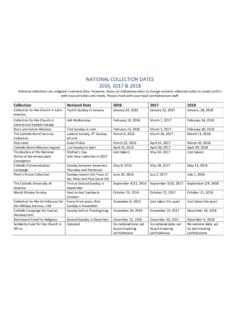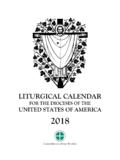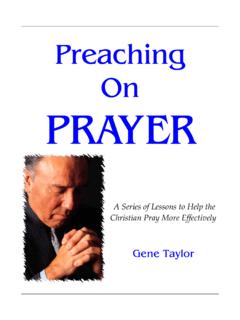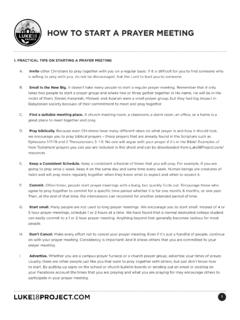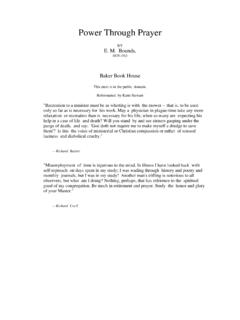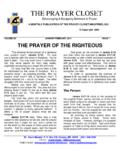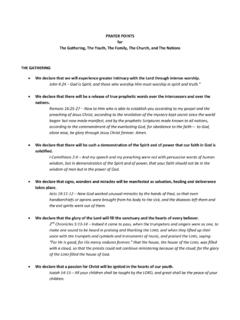Transcription of Caring for God’s Creation - usccb.org
1 Caring for God s Creation Resources for Liturgy, preaching , and Taking Action 1 Dear Reader, As Catholics, we have a rich heritage of faith, tradition, and social teaching to draw upon as we seek to live the Gospel faithfully in our own time and situation. As a community of faith, we seek to protect the dignity of every person and promote the common good of the human family, particularly the most vulnerable among us. The Church champions the rights of the unborn, seeks to bring dignity to the poor, works to overcome the scourge of racism, and welcomes the stranger among us.
2 In parishes, diocese and other Catholic organizations, we encourage efforts to bring about discussion on issues affecting the environment (climate change, consumption, pollution, stewardship of the land) that is civil and constructive, that invokes the virtue of prudence in seeking solutions, and that is more responsive to the needs of the poor, both here in the United States and abroad. As Catholics, we have a unique opportunity and responsibility to make a difference in addressing the impacts these issues present, particularly on those least able to endure the burdens. Table of Contents: What You Can Do Today Liturgical Aids: Scripture, Prayer and Song for the Parish and Home preaching Environmental Justice Environmental Quotes Copyright 2015, United States Conference of Catholic Bishops.
3 All rights reserved. This text may be reproduced in whole or in part without alteration for nonprofit educational use, provided such reprints are not sold and include this notice. Scripture excerpts from the New American Bible, revised edition copyright 2010, 1991, 1986, 1970 by the Confraternity of Christian Doctrine, Inc., Washington, Used with permission. All rights reserved. No part of the New American Bible may be reproduced by any means without permission in writing from the copyright holder. Excerpts from the Catechism of the Catholic Church, second edition, copyright 2000, Libreria Editrice Vaticana-United States Conference of Catholic Bishops, Washington, Used with permission.
4 All rights reserved. Excerpts from the Compendium of the Social Doctrine of the Church 2004 Libreria Editrice Vaticana, Vatican City. Used with permission. All rights reserved. Excerpts from Bishops documents, Copyright United States Conference of Catholic Bishops. All rights reserved. All quotes from Popes and Vatican sources, copyright Libreria Editrice Vaticana (LEV), Vatican City. Used with permission. All rights What You Can Do Today CATHOLIC CLIMATE CHANGE JUSTICE AND HEALTH INITIATIVE The United States Conference of Catholic Bishops' ( usccb ) statement, Global Climate Change: A Plea for Dialogue, Prudence, and the Common Good is a particularly useful document for discussion groups.
5 The Department of Justice, Peace and Human Dignity has produced resources for education and action. For more information, please visit usccb 's Environmental Justice Program Web site: TAKING ACTION Questions for consideration: (Taken from Renewing the Earth: An Invitation to Reflection and Action on Environment in Light of Catholic Social Teaching, 1991) For Catholics How are we called to care for God s Creation ? How may we apply our social teaching with its emphasis on the life and dignity of the human person, to the challenge of protecting the earth, our common home?
6 What can we in the Catholic community offer to the environmental movement, and what can we learn from it? How can we encourage a serious dialogue in the Catholic community in our parishes, schools, colleges, universities and other settings on the significant ethical dimensions of the environmental crisis? For People of Good Will across the Country: How do we proceed to frame a common and workable environmental ethic? What steps can we take to devise a sustainable and just economy? What can we do to more firmly link the in the public mind both the commitment to justice and duties to the environment?
7 How can we recognize and confront the possible conflicts between environment and jobs, and work for the common good and solutions that value both people and the earth? How do we secure protection for all God s creatures, including those who live in poverty and the unborn? How can the United States, as a nation, act responsibly about this ever more global problem? How in working for a sustainable global economy, do we fulfill our obligations in justice to those who are poor in developing nations? 3 TAKING ACTION IN MY STATE 1. Encourage lawmakers to improve and update public transportation options.
8 When effective and far-reaching public transportation systems are in place, fewer cars clog the roads to emit greenhouse gases and air-polluting contaminants. 2. Join local efforts of groups working with elected officials and community leaders to explore ways your local community can do business and reduce harmful emissions. 3. Organize or participate in local and state Earth Day celebrations to raise awareness of the challenges of climate change. 4. Pay attention to legislation going before the state legislature that concern climate, emissions, or energy policies. Urge legislators to remember that people who live in poverty in your state may suffer the most from climate change and that legislative measures should include provisions that address disproportionate economic impacts, , in heating and transportation costs.
9 TAKING ACTION NATIONALLY The United States Conference of Catholic Bishops is urging that any legislative action on climate change include provisions that (a) ease the burden on low-income communities and those who live in poverty; (b) offer relief for workers who may be displaced because of climate change policies; and (c) promote the development and use of alternate renewable and clean-energy resources, including the transfer of such technologies and also technical assistance that may be appropriate and helpful to developing countries in meeting the challenges of climate change.
10 Write to your senators and representatives in Congress. Let them know that you care about climate change and support action on a national level that includes the three key priorities above. For background information on the issue, go to and the Catholic Climate Covenant All across our country, Catholics are taking the St. Francis Pledge to Care for Creation and the Poor and joining the Catholic Climate Covenant. The St. Francis Pledge is a promise and a commitment by Catholic individuals, families, parishes, organizations and institutions to live our faith by protecting God s Creation and advocating on behalf of people in poverty who face the harshest impacts of global climate change.
